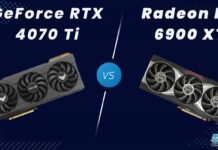Ryzen 5 9600X Rated: 7.6/10 Core i7-14700K Rated: 8.1/10
Pros And Cons
| CPU | Pros | Cons |
|---|---|---|
| Ryzen 5 9600X | ✅ More modern manufacturing process ✅ 11% faster in a single-core | ❌ Slightly worse in terms of performance |
| Core i7 14700K | ✅Has 14 more physical cores ✅ Better in terms of performance | ❌ Higher price tag |
Comparison Table
| Feature | Ryzen 5 9600X | Core i7 14700K |
|---|---|---|
| Codename | Zen 5 (Granite Ridge) | Raptor Lake Refresh |
| Integrated GPU | Radeon Graphics | UHD Graphics 770 |
| GPU Boost Clock | 2200 MHz | 1600 MHz |
| Memory Size | 192 GB | 192 GB |
| Max. Memory Channels | 2 | 2 |
| PCI Express Lanes | 28 | 20 |
| Best Motherboards | Best Motherboards For Ryzen 5 9600X | The Best Motherboards For i7-14700K |
| Best RAM | Best RAM For Ryzen 5 9600X | Best RAM For i7-14700K |
| Best GPU | - | BEST GPU For Core i7-14700K |
Architectural Differences
- Core Count: The Core i7-14700K has a total of 20 cores, with a mixture of performance and efficiency cores, that up to 28 threads. In contrast, the 9600X has 6 cores and 12 threads.
- Clock Speed: The 14700K has a base frequency of 3.4GHz on its performance cores, while it can boost all the way to 5.6GHz. The 9600X has a higher base of 3.9GHz, with a boost to 5.4GHz.
- Process Node: Intel has stuck with their 10nm processing nodes of the 14700K, while AMD uses much more recent and efficient 4nm nodes for the 9600X.
- TDP: The Intel chip has a higher PL1 TDP of 125 watts, whereas the efficiency of the 9600X allows it to have a much lower TDP of only 65 watts.
- L3 Cache: AMD used to have an ace up of its sleeves with its L3 cache, but the 9600X has only 32 megabytes of cache, while the 14700K has a similar 33 megabytes.
The new Ryzen 9000 lineup from AMD has lofty expectations from PC hardware enthusiasts, so much so that some of us think they can run circles around Intel. Will this be the case, or will Intel triumph once more? Keep reading the Ryzen 5 9600X vs Core i7-14700K to find out!
Gaming Benchmarks – 1080p
No better way to see how these chips compare than pinning them against one another in gaming benchmarks. To get the performance of these chips, we have used a controlled test bench, the specifications of which are listed below:
Test Bench
- OS – Windows 11
- RAM – V-Color Manta XPrism RGB DDR5 7200MHz 32GB RAM
- CPU Cooler – Noctua NH-D9L chromax.black
- Graphics Card – GIGABYTE RTX 4090 Gaming OC 24G
- SSD – XPG Gammix S70 Blade 2TB NVMe
- Power Supply – DeepCool PX1000G ATX3.0 PSU
Baldur’s Gate 3

- This game disappointed us, with the 9600X getting an average framerate of 111 FPS, which was around 17% behind the 14700K’s framerate of 130 FPS on average.
- The minimum framerates in Baldur’s gate 3 showed a difference of 10%, with the 14700K being in the advantage, with a framerate of 88 FPS compared to the 80 FPS of the 9600X.
The Last Of Us

- The Last Of Us also came as a disappointment, with the 9600X getting an average of 162 FPS, around 13% behind the 183 FPS of the 14700K.
- The minimum framerates stood around 14% apart in our testing, with the 9600X getting a framerate of around 111 FPS, while the 14700K stood around 127 FPS.
Cyberpunk 2077

- The streak of lukewarm performance for the Ryzen continued in our test of Cyberpunk, with an average framerate of 136 FPS, around 19% lower than the 162 FPS of the 14700K.
- The 1% lows also showed a disparity of around 19%, with the 9600X hovering around 102 FPS in tough-to-render scenes, while the 14700K held onto 127 FPS.
Hogwarts Legacy

- There was a performance difference of around 22.5% in our test of Hogwarts Legacy, with the 9600X getting an average of around 102 FPS, while the 14700K held around 125 FPS.
- The minimum framerates tanked in this game for the Ryzen, with 1% lows of 60 FPS, while the 14700K was much smoother, being 36% ahead with lows of 82 FPS.
Assetto Corsa Competizione

- Our racing sim of choice surprisingly ended in a tie between our two processors, with the 9600X and 14700K both getting an average framerate of 166 FPS.
- The minimum framerates had a difference of 9%, with the 14700K being in the lead, with a framerate of 145 FPS, while the 9600X had a framerate of around 133 FPS.
Spider-Man Remastered

- Slinging through New York gave us an average framerate of 149 FPS on the Ryzen, while the 14700K was about 20% ahead with an average framerate of 180 FPS.
- The difference in the 1% lows came down to around 7.7%, with the 9600X hovering around 116 FPS, whereas the 14700K plateaued around 125 FPS.
Homeworld 3

- Our test of Homeworld 3 also resulted in a tie, with both of our processors getting an average framerate of around 72 FPS.
- The minimum framerates were absolutely horrible on both processors, with the 9600X hovering around 29 FPS, 45% ahead of the 20 FPS of the 14700K.
A Plague Tale: Requiem

- The last game of our testing gave the 9600X its first win, with an average framerate of 149 FPS, a measly 1.4% ahead of the 14700K’s average of 147 FPS.
- The 1% lows were also barely better on the 9600X, with a framerate of 112 FPS, only 1.8% ahead of the 110 FPS of the 14700K.
Overall Gaming Performance
Average Framerate
The 9600X thoroughly disappointed us in these gaming tests, with an overall average over eight games being around 15 frames behind the 14700K, which computes a difference of around 11%.
1% Lows
The difference in the 1% lows amounted to around 10 frames in our testing, which comes out to around 10%, with the 14700K being in the clear advantage.
Regarding game-to-game performance, only a few games had the 9600X close to the 14700K, with most running substantially better on the Intel processor. The Core i7-14700K easily wins in terms of performance, but let’s look at the performance in other aspects.
Power Consumption
| Game | Ryzen 5 9600X | Core i7 14700K |
|---|---|---|
| Baldur's Gate 3 | 82 | 110 |
| The Last Of Us | 95 | 109 |
| Cyberpunk 2077 | 95 | 120 |
| Hogwarts Legacy | 87 | 106 |
| Assetto Corsa Competizione | 83 | 107 |
| Spider-Man Remastered | 89 | 109 |
| Homeworld 3 | 85 | 112 |
| A Plague Tale: Requiem | 93 | 102 |
| Average Power Draw | 88.625⚡ | 109.375⚡ |
| Winner: Ryzen 5 9600X | ||
After the thorough disappointment in performance because of the 9600X, it was refreshing to see that it held its weight regarding power efficiency. In our tests, we measured the Ryzen to be around 23.4% less power-hungry on average, an impressive difference.
Temperatures
| Game | Ryzen 5 9600X | Core i7 14700K |
|---|---|---|
| Baldur's Gate 3 | 65 | 69 |
| The Last Of Us | 64 | 67 |
| Cyberpunk 2077 | 66 | 68 |
| Hogwarts Legacy | 63 | 65 |
| Assetto Corsa Competizione | 59 | 64 |
| Spider-Man Remastered | 61 | 68 |
| Homeworld 3 | 65 | 68 |
| A Plague Tale: Requiem | 63 | 67 |
| Average Temperature | 63.25🌡️ | 67🌡️ |
| Winner: Ryzen 5 9600X | ||
As you can see from the chart above, the temperatures are nothing to be concerned about with either of these chips. Yes, the Core i7-14700K ran around 6% warmer than the Ryzen 5 9600X, but its temperatures are still completely acceptable and no cause for concern.
Price And Availability
| CPU | Launch MSRP | Current Price |
|---|---|---|
| Core i7 14700K | 💲409 | 💲369 |
| Ryzen 5 9600X | 💲279 | 💲279 |
| Price Difference | 37.79% | 27.78% |
Our disappointment with the Ryzen 5 9600X lessened quite a bit when we looked at the price of these processors. Currently, the Ryzen is around 28% cheaper than the Intel processor. These prices are prone to change in the future, so do your due diligence before buying either CPU.
What We Recommend
Core i7-14700K: This processor offers superior performance but comes with higher power consumption, cost, and slightly warmer temperatures. Still, isn’t performance the main deciding factor for most people buying a processor, especially for gaming?
Ryzen 5 9600X: While it lags in performance compared to the 14700K, the Ryzen 5 9600X is cheaper, more power-efficient, and offers better warranties due to its newer release. These aspects make it better suited for a more budget restrained build.
The 14700K is ideal for those prioritizing performance, but the 9600X is a solid choice for budget-conscious buyers. We lean towards the 14700K for its added power.
The PassMark Multi-core test has a 79% better score on the 14700K when compared to the 9600X because of its sheer advantage in core count. The single-core performance of the 9600X is only around 2% better than the 14700K, according to the PassMark Single-core test. FAQs
More From Core i7-14700K
Thank you! Please share your positive feedback. 🔋
How could we improve this post? Please Help us. 😔
[Comparisons Expert]
Shehryar Khan, a seasoned PC hardware expert, brings over three years of extensive experience and a deep passion for the world of technology. With a love for building PCs and a genuine enthusiasm for exploring the latest advancements in components, his expertise shines through his work and dedication towards this field. Currently, Shehryar is rocking a custom loop setup for his built.
Get In Touch: shehryar@tech4gamers.com


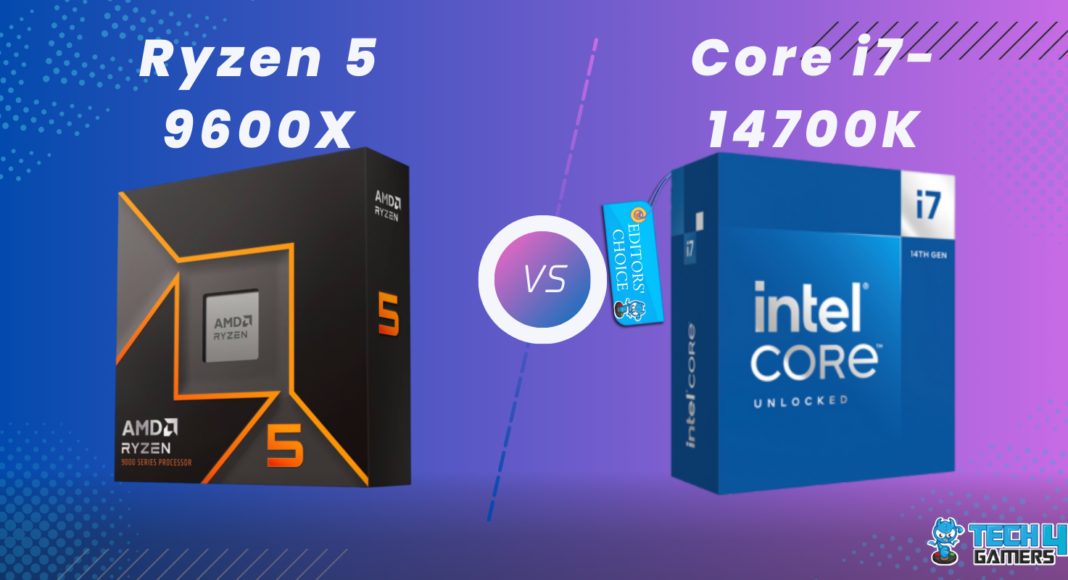
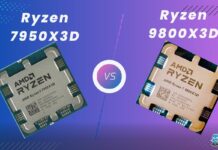
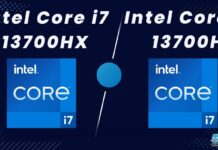
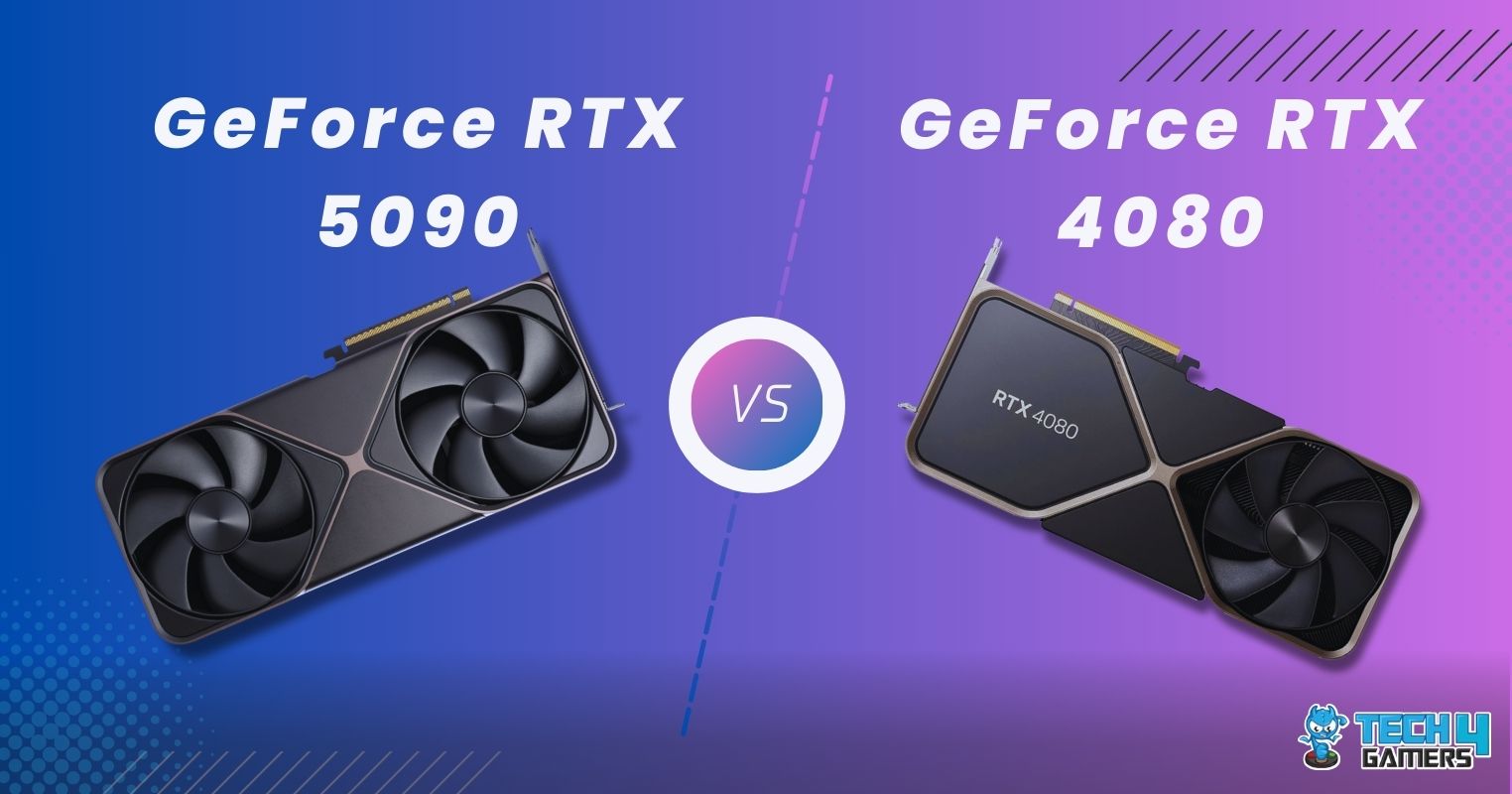
![i9 13900KS Vs Ryzen 7 7800X3D [We Tested 7 Games] i9 13900KS Vs Ryzen 7 7800X3D](https://tech4gamers.com/wp-content/uploads/2024/11/i9-13900KS-Vs-Ryzen-7-7800X3D-218x150.jpg)
